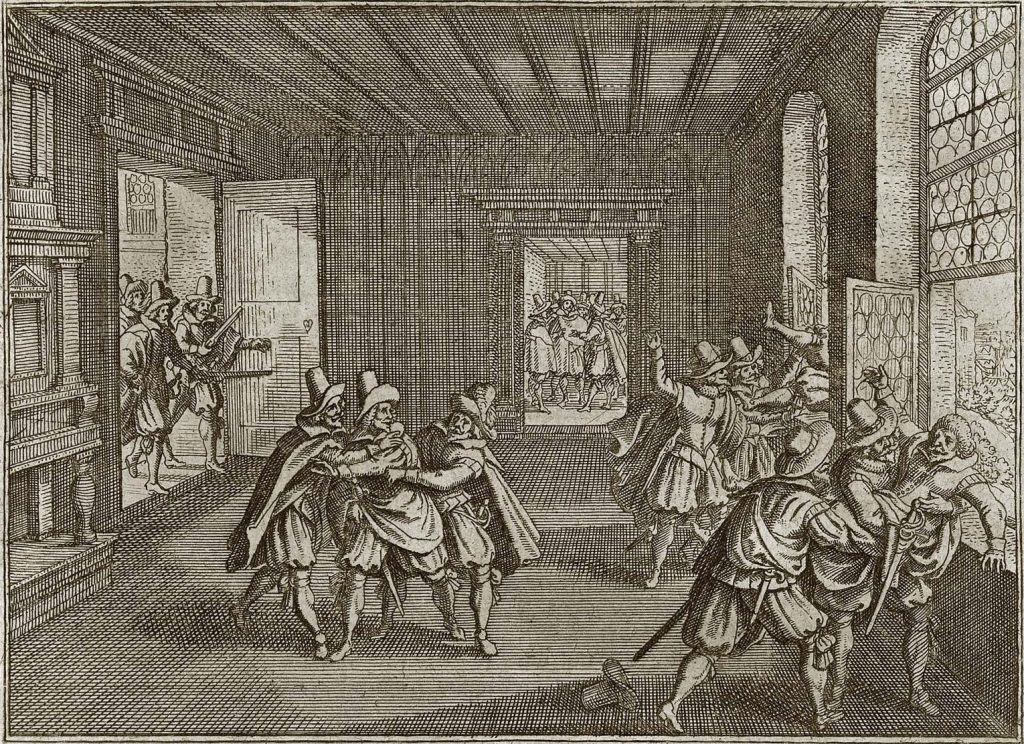Don’t get me wrong, I have been a huge fan of both America and Americans since watching the Apollo space program as a kid on a black and white TV in my parent’s house in Germany. But it’s not the ’60s anymore; it feels more like the 1600s. And no, I am not talking about the year 1620 or its woke neighbor 1619. The high-speed time machine that the entire US sits in right now has its dial pointing to 1618 Europe — Prague to be exact.

That is when and where the largest massacre in Europe started over whose faith is the right faith. Catholics and Protestants had come to the conclusion that after a century of fruitless debate, battling it out was the best option — with each side convinced that the Lord had their backs. The Lord, alas, decided to stay out of it and the ferocious war that followed ended in a tie after raging for 30 years.
The war left half of central Europe’s population dead and the other half scratching their heads over the benefits of organized religion and clerical propaganda. So, it was no accident that the age of reason and realpolitik came next, at least on the east side of the Atlantic. Arguing over science and fact-based knowledge turned out to be more productive than questioning the validity of each other’s faith. The early Americans missed out on the sobering experience of the Thirty Years’ War. Boarding the Mayflower in 1620 was perfect timing if you wanted to bring with you an untainted love for bizarre theological certainties and the Bible as a literally true and unfailing guide to the future, even in politics.
By the 1980s, the Pilgrims’ Puritanism felt much more relaxed. That’s when I first moved to the US. To me America appeared refreshingly secular and pragmatic even if Ronald Reagan had an annoying habit of invoking the Almighty in his speeches against the godless communists and their evil empire. Democrats and Republicans got along much better than political parties in Germany, and if there was any dogma, it was “living louder” in the German Christian Democratic Union (CDU) than in the GOP.
Today the mood in America has reverted back to the pre-Enlightenment era. Everyone in the US who speaks into a microphone — be it your representative in DC or your neighbor in the local news — is a person “of faith” and offers prayers for the occasion. Which makes me shudder, particularly since faith is absolute, and biblical teachings don’t exactly promote the value of compromise. As diverse as the current 116th Congress is otherwise, based on recent surveys not a single member identifies as atheist (or dares to do so anymore). No wonder that in such a spiritually charged climate, issues that have long been settled legally and without much public noise in more secular countries, have turned into matters of faith, morality and divine rights in the US: abortion, guns, healthcare, and supreme court justices.
It is hard to imagine that a candidate for a constitutional court in a Western European country (that has a memory of the Thirty Years’ War) would be advertised as a “judge grounded in faith and family,” presenting herself as a proud and prolific Catholic like Amy Coney Barrett does. It smacks too much of Gegenreformation. Counter-Reformation was the Catholic Habsburgs’ campaign to roll back progressive Protestantism in the Holy Roman Empire, which finally, in 1618, led to a clash of belief systems that at the beginning was actually more slapstick than jihad: Imperial officials who tried to reign in the “liberal” Bohemian Protestants were not shown the door but a window of Prague Castle and out they went from the third floor.
To everyone’s surprise, there were no serious injuries. This, however, didn’t prevent the Catholic Empire from striking back at the Protestants with full force. The rest is bloody history. I wonder if America’s Religious Right will mount a similar response when their chosen one experiences his defenestration on November 3rd. There are probably enough guns in this country to re-enact all battles of the Thirty Years’ War, but my hope is that somehow, miraculously, the age of reason will stage a strong comeback in the US before it’s too late.
Henning Schroeder is a former vice provost and dean of graduate education at the University of Minnesota. His email address is schro601@umn.edu and his Twitter handle is @HenningSchroed1.

Comments 2
Andy Steinfeldt — October 20, 2020
Fabulous history lesson and essay, as always!
Frank M Flanagan — October 21, 2020
This articulates a fear of the outcome of this election that I have had from the get-go. Trump is not heading for a defeat ... he is heading for a conflict. How else to make sense of his rhetoric ( such as it is!)